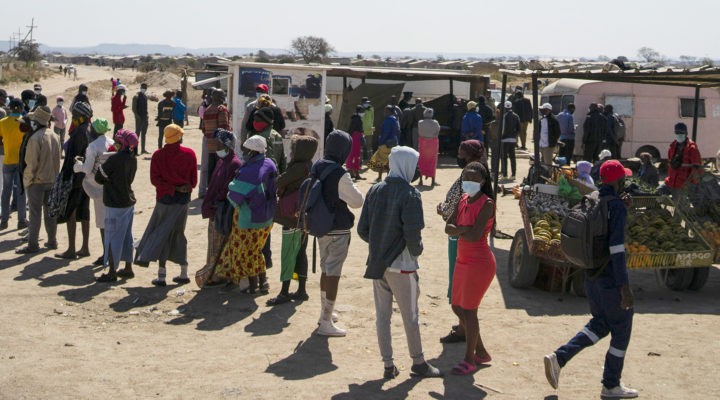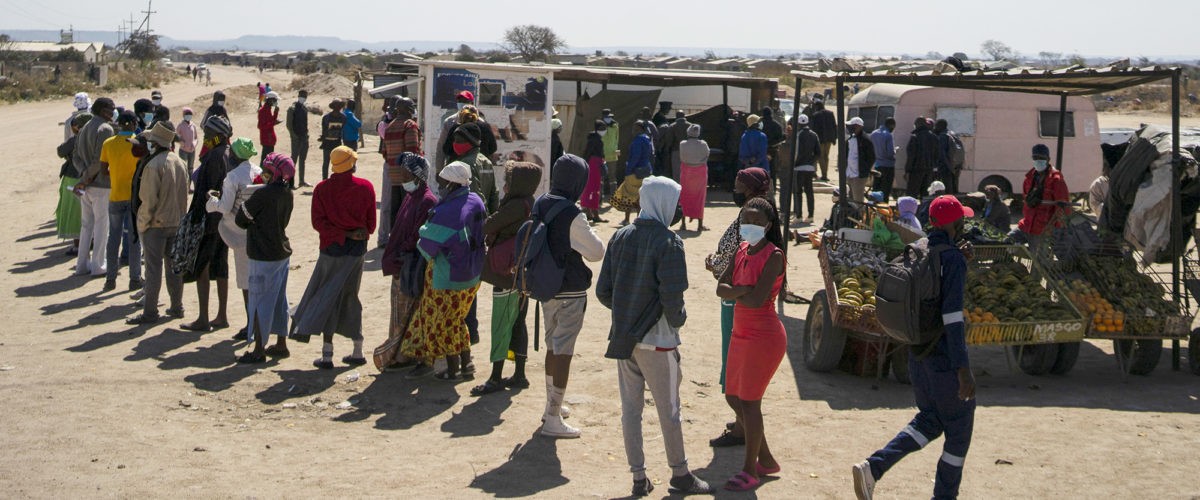How possible is it that the continent with the lowest COVID-19 infection rate could potentially become the biggest spreader of new mutations of the deadly virus across the world?
The answer to that question lies in a new report published in the journal Science on Sept. 9. The study describes “the genomic epidemiology using a dataset of 8,746 genomes from 33 African countries and two overseas territories.”
“Africa accounts for a relatively low proportion of reported cases and deaths — by the end of April 2021, there had been 4.5 million cases and 120,000 deaths on the continent, corresponding to less than 4% of the global burden,” the report explains.
Less than 3% of an estimated 1.3 billion African population have been vaccinated, compared to about 70% of adults in the European Union that have been inoculated or 75% of adult Americans that have received at least one dose of the vaccine.
And from the onset of the pandemic, genomic surveillance has been at the heart of the COVID-19 response in African countries like Nigeria, where the first genome sequence was released only three days after the announcement of the first case; in Uganda, where a sequencing program was rapidly set up to facilitate virus tracing and the collection of samples immediately upon confirmation of the first case; and in South Africa, where a network for genomic surveillance was established in March 2020 and within weeks was helping to make sense of outbreaks and community transmission.
This and other data allowed researchers to infer the number of viral imports and exports of COVID between Africa and the rest of the world, and between individual African countries.
From January 2020 through February 2021, investigators detected at least 757 viral introductions into African countries, more than half of which occurred before the end of May 2020, researchers reported. “While the early phase of the pandemic was dominated by importations from outside Africa, predominantly from Europe, there was then a shift in the dynamics, with an increasing number of importations from other African countries as the pandemic progressed.”
A reverse of this situation, the researchers contend, could worsen the world’s situation if the issue of vaccine inequality is not addressed soon. Africa currently lags behind other continents in battling the virus. Less than 3% of an estimated 1.3 billion African population have been vaccinated, compared to about 70% of adults in the European Union that have been inoculated or 75% of adult Americans that have received at least one dose of the vaccine.
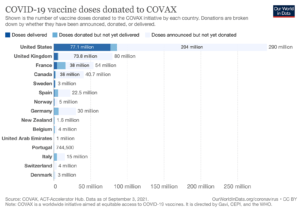 The dominance of COVID variants of interest and variants of concern in Africa “has important implications for vaccine rollouts on the continent,” the report states. “For one, slow rollout of vaccines in most African countries creates an environment in which the virus can replicate and evolve: this will almost certainly produce additional VOCs, any of which could derail the global fight against COVID-19.”
The dominance of COVID variants of interest and variants of concern in Africa “has important implications for vaccine rollouts on the continent,” the report states. “For one, slow rollout of vaccines in most African countries creates an environment in which the virus can replicate and evolve: this will almost certainly produce additional VOCs, any of which could derail the global fight against COVID-19.”
Further, “with the already widespread presence of known variants, difficult decisions balancing reduced efficacy and availability of vaccines have to be made. This also highlights how crucial it is that trials are done.”
Unquestionably, the researchers point out, “rollout of vaccines across Africa has been painfully slow.”
The same point was made by Tedros Adhanom Ghebreyesus, director-general of the World Health Organization, at a media briefing Sept. 8, one of a number of concerns he would raise in recent times on the issue of COVID inequality.
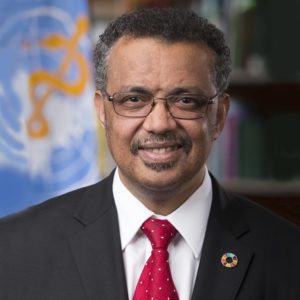
Tedros Adhanom Ghebreyesus
“A month ago, I called for a global moratorium on booster doses at least until the end of September, to prioritize vaccinating the most at-risk people around the world who are yet to receive their first dose,” he said. “There has been little change in the global situation since then, so today I am calling for an extension of the moratorium until at least the end of the year, to enable every country to vaccinate at least 40% of its population.”
On a global scale, the WHO director-general reported that 5.5 billion vaccine doses have been administered, with 80% of them in high- and upper-middle-income countries.
 “High-income countries have promised to donate more than 1 billion doses (to poorer countries, many of which are in Africa) but less than 15% of those doses have materialized. Manufacturers have promised to prioritize COVAX and low-income countries. We don’t want any more promises. We just want the vaccines. More than 50,000 people have died with COVID-19 every week since October last year, and for the past month, deaths have remained at almost 70,000 a week,” Ghebreyesus said.
“High-income countries have promised to donate more than 1 billion doses (to poorer countries, many of which are in Africa) but less than 15% of those doses have materialized. Manufacturers have promised to prioritize COVAX and low-income countries. We don’t want any more promises. We just want the vaccines. More than 50,000 people have died with COVID-19 every week since October last year, and for the past month, deaths have remained at almost 70,000 a week,” Ghebreyesus said.
As far as the WHO helmsman is concerned, COVID-19 could be stopped in its tracks with concerted global efforts.
“We have the solutions to stop transmission and save lives. The inequitable distribution of life-saving tools including diagnostics, oxygen, PPE and vaccines is driving a two-track pandemic,” he warned.
John Nkengasong, director of the Africa Centres for Disease Control and Prevention, this month accused some countries of promising one thing in the media and doing the opposite in reality. To him, vaccine diplomacy, as currently canvassed or mouthed by many top government officials across the world, is akin to political talk that’s better judged on performance.
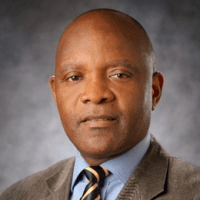
John Nkengasong
“We are not as a continent very keen in any definition of vaccine diplomacy that will mean that people make statements in the media that are not really backed with reality,” he said. “Pledges do not put vaccines into people’s arms. We want real vaccines, not just pledged vaccines.”
However, the African Union is not just folding its arms and waiting on foreign countries to solve all Africa’s COVID problems. While still waiting to receive pledged vaccines from donor nations, the AU, through its agencies, is working to improve the capacity of vaccine manufacturing companies on the continent to help fill the gaps as well as speed up delivery of available vaccines to member states.
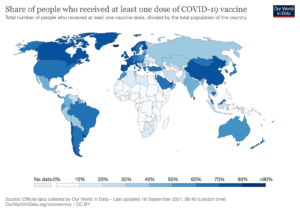 On Sept. 6, the African Vaccine Acquisition Trust, which was created by the African Vaccine Acquisition Task Team established in November 2020 by the African Union to serve as a vaccine procurement channel, announced the delivery of 108,000 doses of the Johnson & Johnson single-shot vaccines to Ethiopia.
On Sept. 6, the African Vaccine Acquisition Trust, which was created by the African Vaccine Acquisition Task Team established in November 2020 by the African Union to serve as a vaccine procurement channel, announced the delivery of 108,000 doses of the Johnson & Johnson single-shot vaccines to Ethiopia.
Three days earlier, Kenya also received 141,600 vaccine doses from AVAT. The deliveries were part of 6.4 million vaccine doses earmarked for African Union Member States last month.
Aside striving to meet its vaccine targets through AVAT, the African union announced that Johnson & Johnson COVID-19 vaccines assembled in South Africa would henceforth be utilized on the African continent rather than shipped abroad, as was previously the case. It also said millions of vaccines from the South African plant stored in warehouses outside the continent should be returned and distributed to people on the continent in need of them.
The AU’s decision came on the heels of criticisms that Johnson & Johnson was focused on sending vaccines to countries that already had a high inoculation rate, with some of their citizens already getting a third booster shot while less than 3% of the African population have been vaccinated and the idea of a booster shot for many on the continent, as things currently stand, is a mirage.
Although there are some who cite vaccine hesitancy among the African populace as an impediment to vaccine equality — that being a fallout of the many conspiracy theories which some people, including religious leaders, continue to spread about COVID-19 — Envoy Strive Masiyiwa said the concern should be about making the vaccines available for people who are willing to take the shot.
“In Africa, the issue is vaccine supply. Even if there are loud noises about vaccine hesitancy — and we will not dismiss it — let’s get to 60%, OK, and then we worry about the 40%,” Masiyiwa said. “The international community has not met its obligations under (the) understanding of COVAX. COVAX was supposed to deliver 320 million doses by August. In a letter to us that we received only yesterday, that number is 30 million doses.”
Anthony Akaeze is a Nigerian-born freelance journalist who currently lives in Houston. He covers Africa for BNG.
Related articles:
While Americans reject COVID vaccines, other parts of the world beg for access
Honoring vaccination status is the next step for social justice | Opinion by Amber Cantorna

